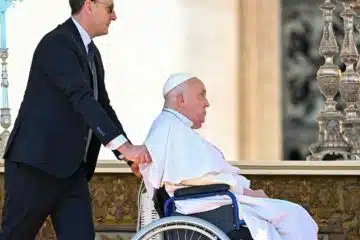How Christ’s ascension takes the training wheels off our faith
National Catholic Register, May 9, 2024 / 04:00 am
Christ’s ascension is meant to help us to grow to full stature in Christ as we respond to his confidence in making us his missionaries, together with the Holy Spirit, to renew the face of the earth.
The celebration of the solemnity of the Ascension of the Lord is an annual opportunity for us not only to focus on heaven, where the Lord Jesus has gone to prepare a place for us (Jn 14:1-6) and on the joy that “eye has not seen, ear has not heard, nor the human heart conceived,” which “God has prepared for those who love him” (1 Cor 2:9; Is 64:4), but also on the implications Jesus’ return to the Father means for each of his followers.
Jesus could have stayed on earth until the end of time as the Good Shepherd, crisscrossing the globe after every lost sheep, saving them one by one. As he ascended, however, he placed his own mission in our hands, commanding us to “go into the whole world and proclaim the Gospel to every creature” (Mk 16:15).
He took the training wheels off our discipleship and removed any excuses we might have to pass the buck of sharing and spreading the faith. “You will be my witnesses,” he told us, “in Jerusalem, in all Judea and Samaria, and to the ends of the earth” (Acts 1:8).
His confidence and trust in us, despite all our weaknesses, is astonishing. He wanted to incorporate us into — actually entrust to us — his mission of the redemption of the world.
But he didn’t leave us orphans (cf. Jn 14:18).
St. Luke gives us a beautiful image and detail, that Jesus “led them out as far as Bethany, raised his hands, and blessed them. As he was blessing them, he parted from them and was taken up to heaven” (Lk 24:50-51).
Jesus departed in the very act of blessing us. Pope Benedict in his trilogy “Jesus of Nazareth” commented on how the risen Jesus in heaven is perpetually blessing us.
“Jesus departs in the act of blessing,” he states. “He goes while blessing, and he remains in that gesture of blessing. His hands remain, stretched out over this world … [which] expresses Jesus’ continuing relationship to his disciples, to the world. … That is why the disciples could return home from Bethany rejoicing. In faith we know that Jesus holds his hands stretched out in blessing over us. That is the lasting motive of Christian joy.”
Jesus is continuously blessing us with every spiritual blessing in the heavens (cf. Eph 1:3). He’s seeking to transform us into his incarnate benediction of the world.
The great manifestation of that blessing is the descent of the Holy Spirit, for whose renewed coming we pray in the annual decenarium from the 40th to 50th days of Easter. St. Luke recalls Jesus’ words: “You will receive power when the Holy Spirit comes upon you, and you will be my witnesses” (Acts 1:8). That’s the power, the blessing, that came down upon the Church on Pentecost.
During the Last Supper, Jesus said something startling: “I tell you the truth: It is to your advantage that I go away, for if I do not go away, the Advocate will not come to you; but if I go, I will send him to you” (Jn 16:7). He was describing the incredible gift of the Holy Spirit’s presence as a blessing even greater than his own. That’s what the Church, huddling around the Blessed Virgin Mary, incessantly begs for after the Ascension.
The Holy Spirit helps us to fulfill, and not shirk, the awe-inspiring responsibility Christ has given us. This is the duty to give witness that Christ is alive, that he is the Way, the Truth, the Resurrection, and the Life, that he came to give us life to the full, so that his joy may be in us and our joy may be complete; he came to give and leave us the peace of his kingdom in a war-torn world; he came to help us and others to change our lives, to believe wholeheartedly in the Good News, and to follow him, so that where he is we also may be and so that we might recognize that God the Father loves us just as much as he loves Jesus (cf. Jn 14:6; 11:25; 10:10; 15:11; 14:27; Mk 1:15; Jn 16:27; 15:9).
That’s a message and a mission that many no longer easily receive.
Whether they think erroneously that science has disproven faith, or the problem of evil has refuted the possibility of a good God, or the clergy sex-abuse scandals have invalidated the Church’s witness, or the frigidity with which so many secularized Christians live their faith has revealed its incapacity to inspire, or a score of other possible reasons people cite to deaden the appeal of Christian faith and life, it’s clear that proclaiming the Gospel effectively to every creature is challenging work — but so was trying to convince down-to-earth first-century pagans and Jews that a crucified carpenter had not only risen from the dead but was the Savior of the world. The same blessing of the Holy Spirit that made their joint witness fruitful desires to give tandem testimony with us.
One of the most effective ways to do so is through charity.
Back in 1985, the future Pope Benedict XVI gave a radio address in which he focused on the “delightfully naïve pictures” of the Ascension in which the disciples are looking upward as Jesus is passing through the clouds and all we see are Jesus’ feet, the same feet the women wanted to grasp onto after the Resurrection. Cardinal Ratzinger commented that we need to recognize his feet and reverence them in disguise in the feet around us as we follow Christ’s example of washing the feet of others just as he cleansed the apostles’ feet in the Upper Room.
“The true ascent of mankind,” he stated, “takes place precisely when a man learns to turn in humility to another person, bowing deeply at his feet in the position of one who would wash the feet of the other. It is only in the humility that knows how to bow down that can raise a person up.”
In order to ascend, we need first to descend humbly in acts of corporal and spiritual works of mercy, including passing on the faith to those who don’t know it or who reject what they mistakenly believe it to be.
Christ’s ascension is meant to lead us on an exodus not merely in the future, but here and now: an exodus from the self toward God and others, a journey from fear to trust, a passover from the flat earth of a world without God to the multidimensional reality of Christ’s kingdom.
Christ’s ascension is meant to lift up our hearts as it helps us to drop to our knees. It is meant to help us to grow to full stature in Christ as we respond to his confidence in making us his missionaries, together with the Holy Spirit, to renew the face of the earth. It is meant to fill us, even now, with lasting joy.
This story was first published by the National Catholic Register, CNA’s sister news partner, and has been adapted by CNA.













